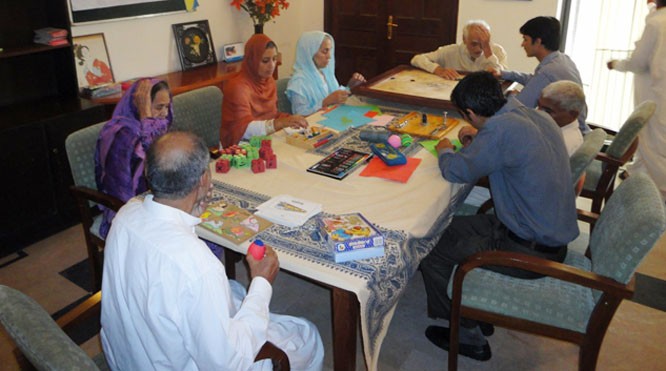
Alzheimer’s Pakistan’ day care centre for adults is providing families with a warmer, friendlier alternative to traditional old homes

Every sixty seconds, someone in the world develops an incurable disease that affects not just their physical health but also their memory, thinking, behaviour and emotions. This person’s brain chemistry begins to change portraying symptoms such as loss of memory and sensory abilities. The brain begins to shrink until a gap develops impacting the brain cells, nerves and transmitters of the victim. Agitation, anxiety, delusions, depression, hallucinations, insomnia and wandering are all unavoidable behavioural symptoms that accompany this disease. 48 million people, worldwide, suffer from Dementia (progressive degenerative brain syndromes), and the numbers are likely to triple by 2050.
Alzheimer’s disease is the most common cause of dementia in the world. According to the Pakistani neurologist Dr Wasey Shakir, "the extrapolated prevalence of people with dementia disease in Pakistan is around 200,000." However, despite these alarming numbers, awareness and assistance to help deal with this disease is limited in the country. ‘Alzheimer’s Pakistan’ (the National Organisation of Alzheimer’s and related dementias) is one of its kind. Since its inception in 1999, the organisation has not only spread mass awareness about the disease but has also provided services like memory clinics and support groups.
Recently, the organisation developed the first-day care centre in Pakistan for people suffering from Alzheimer’s disease and related dementias. The Alzheimer’s Day Care Resource Centre currently located in Johar Town Lahore is open to adults with mild and moderate stages of Alzheimer’s disease and other dementias. Services such as physiotherapy, daily lunches, light exercises, specialised activities, door-to-door transportation to and from the centre, referral for medical services, weekly memory clinic, and services of psychologists are available at the clinic free of cost.
Dr Hussain Jafri, the general secretary of Alzheimer’s Pakistan and the brains behind the project, explains how the daycare (under Alzheimer’s Pakistan) was built so "what we have suffered others should not suffer!" He further elaborates on this, "My grandfather suffered through dementia during the ‘90s. The doctors were unable to diagnose the disease leaving us without any way to deal with the symptoms. It took us about one and a half year just to get the diagnosis. With no awareness or avenues for treatment, dealing with the disease became extremely hard." The daycare, in Lahore, works to ensure that treatment is available to all families free of cost and that any questions or concerns can be instantly answered in order to make the process of caring for suffering loved ones easier.
While the disease is extremely troubling for the person suffering, it also takes a huge emotional toll on the family of the patient. "By leaving their elderly with us for a few hours the caretakers can take a break and carry on with their daily tasks without having to worry about keeping a constant eye on their loved one," says Dr Jafri.
The visitors of the daycare spend an entire day away from home in an interesting and productive environment. Their day begins by sitting in groups and listening to recitations of the Holy Quran, Naats and Sufi folk songs. The staff of the centre then reads the newspaper out loud in order to keep the visitors up to date and connected with the events around the world. This is followed by a huge range of activities for the patients. A personal relationship is developed with each patient so the activities carried out are fit for every single patient and in accordance with their personal preferences. These activities range from colouring, painting, drawing and board games to anything else that helps engage the visitors. Following this is lunchtime, after which the patients get some time to relax and sit back.
On an average day, the centre gets about ten visitors who are picked and dropped from and to their homes. Six trained staff members are available to care for these visitors along with a doctor present fortnightly. As a member of ‘Alzheimer’s disease international’, the daycare centre has a twinning partnership with Australia, the world leader in dementia-related diseases. Experts from Australia have visited the daycare centre and offered technical assistance and training related to dealing with the disease. This makes the staff and the general atmosphere of the daycare extremely effective and accommodating. "The only services provided for this disease in Pakistan are the ones provided by ‘Alzheimer’s Pakistan’, with information centres in Rawalpindi, Peshawar, Multan and Karachi and daycare in Lahore", claims Dr Hussain Jafri.
According to experts, a day care centre for the patients of dementia is an excellent alternative to old homes as it keeps the patient connected to their family, all while taking off some of the pressure and responsibility from the caretaker’s shoulders. Even when the patients don’t specifically remember their families, the feeling of familiarity at home is crucial to their well-being.
Every day from 9 am to 3 pm this daycare centre in Lahore provides a warm, nurturing and friendly environment that helps adults, suffering from dementia, remain active and involved in the world around them. The daycare is a place where the visitors can engage in activities designed to add meaning to their lives by improving their mental physical functioning!